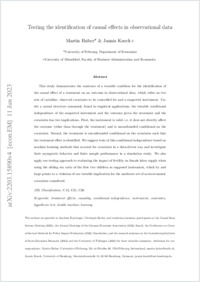Testing the identification of causal effects in observational data
Université de Fribourg BP2-STS
- Huber, Martin ORCID University of Fribourg, Department of Economics
- Kueck, Jannis University of Düsseldorf, Faculty of Business Administration and Economics
- 2022
Published in:
- arXiv:2203.15890v4. - 2022, p. 1-48
Treatment effects
Causality
Conditional independence
Instrument
Covariates
Hypothesis test
Double machine learning
English
This study demonstrates the existence of a testable condition for the identification of the causal effect of a treatment on an outcome in observational data, which relies on two sets of variables: observed covariates to be controlled for and a suspected instrument. Under a causal structure commonly found in empirical applications, the testable conditional independence of the suspected instrument and the outcome given the treatment and the covariates has two implications. First, the instrument is valid, i.e. it does not directly affect the outcome (other than through the treatment) and is unconfounded conditional on the covariates. Second, the treatment is unconfounded conditional on the covariates such that the treatment effect is identified. We suggest tests of this conditional independence based on machine learning methods that account for covariates in a data-driven way and investigate their asymptotic behavior and finite sample performance in a simulation study. We also apply our testing approach to evaluating the impact of fertility on female labor supply when using the sibling sex ratio of the first two children as supposed instrument, which by and large points to a violation of our testable implication for the moderate set of socio-economic covariates considered.
- Faculty
- Faculté des sciences économiques et sociales et du management
- Department
- Département d'économie politique
- Language
-
- English
- Classification
- Economics
- License
- License undefined
- Persistent URL
- https://folia.unifr.ch/global/documents/327405
Statistics
Document views: 15
File downloads:
- Testing the identification of causal effects in observational data_June2023.pdf: 13
